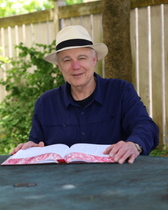Steven Shankman
University of Oregon

STEVEN SHANKMAN holds the UNESCO Chair in Transcultural Studies, Interreligious Dialogue, and Peace and is co-director of the UNESCO Crossings Institute at the University of Oregon, where he is Distinguished Professor Emeritus of English and Classics. Before coming to Oregon, he taught at Princeton, Columbia, and Harvard.
His work in the Western classical tradition includes Pope’s Iliad: Homer in the Age of Passion (1983) and In Search of the Classic: Reconsidering the Classical Tradition, Homer to Valéry and Beyond (1994). His Penguin edition of Pope’s Iliad appeared in 1996. Some of his later work, including The Siren and the Sage: Knowledge and Wisdom in Ancient Greece and China (co-authored with Stephen Durrant, 2000) and Early China/Ancient Greece: Thinking through Comparisons (co-edited by Stephen Durrant, 2002), compares classical traditions. With Stephen Durrant and four others, he is an editor of The World of Literature (1999), an anthology of world literature from a global perspective, which contains some of his own poetic translations from Chinese, Greek, and Latin. He is the author of two books of poems: Kindred Verses, a chapbook, was published in 2000. Talmudic Verses is forthcoming (2023) from Finishing Line Press. His poetry has appeared in a number of journals including Tikkun, Sewanee Review, Literary Imagination, Literary Matters, and Poetica Magazine. Epics and Other Higher Narratives: An Intercultural Approach, co-edited by Amiya Dev, appeared in 2010, as did his book Other Others: Levinas, Literature, Transcultural Studies. He has been a Guggenheim and an NEH Fellow.
His most recent scholarly book is Turned Inside-Out: Reading the Russian Novel in Prison (Northwestern University Press, 2017). He is currently at work on a translation from the French of Suerte: L’exclusion volontaire, a semi-autobiographical novel (1995) by Claude Lucas, the so-called “gangster philosopher” who, before writing Suerte, became a devotee of Emmanuel Levinas’s first magnum opus, Totality and Infinity; and a book on Levinas and Tolstoy.
